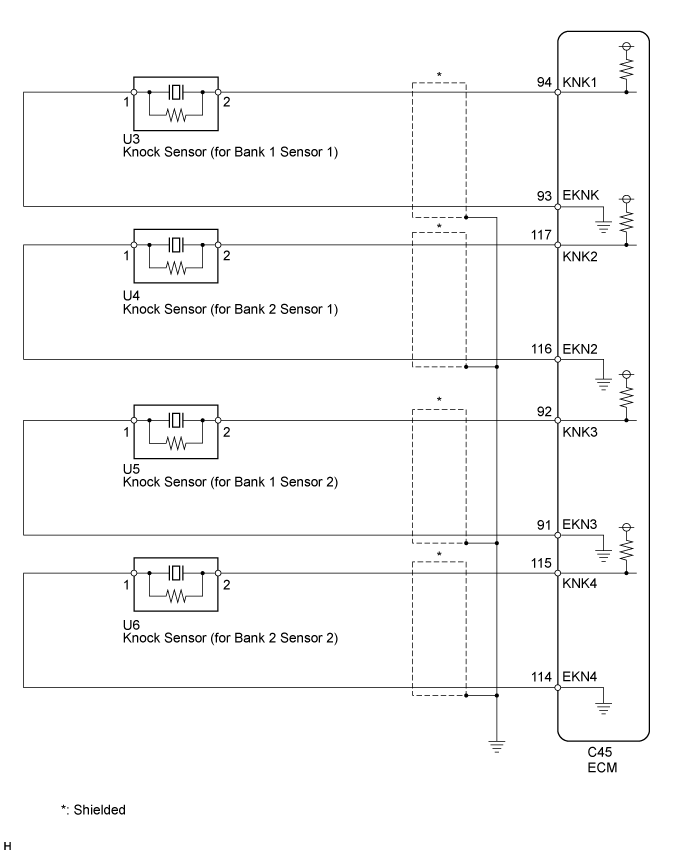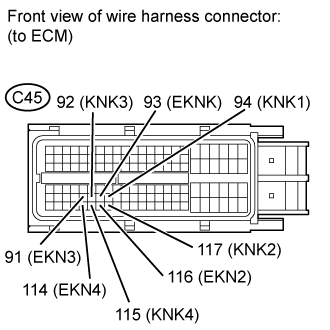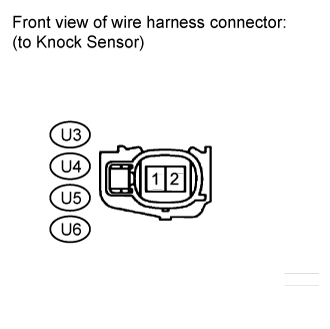Dtc P0327 Knock Sensor 1 Circuit Low Input (Bank 1 Or Single Sensor)
DESCRIPTION
MONITOR DESCRIPTION
WIRING DIAGRAM
INSPECTION PROCEDURE
INSPECT KNOCK SENSOR
CHECK HARNESS AND CONNECTOR (ECM - KNOCK SENSOR)
INSPECT ECM
DTC P0327 Knock Sensor 1 Circuit Low Input (Bank 1 or Single Sensor) |
DTC P0328 Knock Sensor 1 Circuit High Input (Bank 1 or Single Sensor) |
DTC P032C Knock Sensor 3 Circuit Low |
DTC P032D Knock Sensor 3 Circuit High |
DTC P0332 Knock Sensor 2 Circuit Low Input (Bank 2) |
DTC P0333 Knock Sensor 2 Circuit High Input (Bank 2) |
DTC P033C Knock Sensor 4 Circuit Low Input |
DTC P033D Knock Sensor 4 Circuit High Input |
DESCRIPTION
A flat type knock sensor (non-resonant type) has a structure that can detect vibrations between approximately 6 kHz and 15 kHz.Knock sensors are fitted onto the engine block to detect engine knocking.The knock sensor contains a piezoelectric element which generates a voltage when it becomes deformed.The voltage is generated when the engine block vibrates due to knocking. Any occurrence of engine knocking can be suppressed by delaying the ignition timing.DTC Code
| DTC Detection Condition
| Trouble Area
|
P0327
| The output voltage of the knock sensor (for Bank 1 Sensor 1) is 0.5 V or less (1 trip detection logic).
| - Short in knock sensor (for Bank 1 Sensor 1) circuit
- Knock sensor (for Bank 1 Sensor 1)
- ECM
|
P0328
| The output voltage of the knock sensor (for Bank 1 Sensor 1) is 4.5 V or higher (1 trip detection logic).
| - Open in knock sensor (for Bank 1 Sensor 1) circuit
- Knock sensor (for Bank 1 Sensor 1)
- ECM
|
P0332
| The output voltage of the knock sensor (for Bank 2 Sensor 1) is 0.5 V or less (1 trip detection logic).
| - Short in knock sensor (for Bank 2 Sensor1) circuit
- Knock sensor (for Bank 2 Sensor 1)
- ECM
|
P0333
| The output voltage of the knock sensor (for Bank 2 Sensor 1) is 4.5 V or higher (1 trip detection logic).
| - Open in knock sensor (for Bank 2 Sensor1) circuit
- Knock sensor (for Bank 2 Sensor 1)
- ECM
|
P032C
| The output voltage of the knock sensor (for Bank 1 Sensor 2) is 0.5 V or less (1 trip detection logic).
| - Short in knock sensor (for Bank 1 Sensor 2) circuit
- Knock sensor (for Bank 1 Sensor 2)
- ECM
|
P032D
| The output voltage of the knock sensor (for Bank 1 Sensor 2) is 4.5 V or higher (1 trip detection logic).
| - Open in knock sensor (for Bank 1 Sensor 2) circuit
- Knock sensor (for Bank 1 Sensor 2)
- ECM
|
P033C
| The output voltage of the knock sensor (for Bank 2 Sensor 2) is 0.5 V or less (1 trip detection logic).
| - Short in knock sensor (for Bank 2 Sensor 2) circuit
- Knock sensor (for Bank 2 Sensor 2)
- ECM
|
P033D
| The output voltage of the knock sensor (for Bank 2 Sensor 2) is 4.5 V or higher (1 trip detection logic).
| - Open in knock sensor (for Bank 2 Sensor 2) circuit
- Knock sensor (for Bank 2 Sensor 2)
- ECM
|
- HINT:
- When any of DTCs P0327, P0328, P0332, P0333, P032C, P032D, P033C and P033D is stored, the ECM enters fail-safe mode. During fail-safe mode, the ignition timing is delayed to its maximum retardation. Fail-safe mode continues until the engine switch is turned off.
Reference: Inspection using an oscilloscope.
- Standard:
Tester Connection
| Tool Setting
| Condition
| Specified Condition
|
C45-94 (KNK1) - C45-93 (EKNK)
| 0.01 to 10 V/DIV.
0.01 to 10 msec./DIV.
| Keep engine speed at 4000 rpm with warm engine
| The correct waveform is as shown
|
C45-117 (KNK2) - C45-116 (EKN2)
| 0.01 to 10 V/DIV.
0.01 to 10 msec./DIV.
| Keep engine speed at 4000 rpm with warm engine
| The correct waveform is as shown
|
C45-92 (KNK3) - C45-91 (EKN3)
| 0.01 to 10 V/DIV.
0.01 to 10 msec./DIV.
| Keep engine speed at 4000 rpm with warm engine
| The correct waveform is as shown
|
C45-115 (KNK4) - C45-114 (EKN4)
| 0.01 to 10 V/DIV.
0.01 to 10 msec./DIV.
| Keep engine speed at 4000 rpm with warm engine
| The correct waveform is as shown
|
MONITOR DESCRIPTION
The knock sensor, located on the cylinder block, detects spark knock. When spark knock occurs, the piezoelectric element of the sensor vibrates. When the ECM detects a voltage in this frequency range, it retards the ignition timing to suppress the spark knock.The ECM also senses background engine noise with the knock sensor and uses this noise to check for faults in the sensor. If the knock sensor signal level is too low for more than 10 seconds, or if the knock sensor output voltage is outside the normal range, the ECM interprets this as a fault in the knock sensor and stores DTC(s).
WIRING DIAGRAM
INSPECTION PROCEDURE
- HINT:
- DTCs P0327 and P0328 are for the bank 1 sensor 1 knock sensor circuit.
- DTCs P032C and P032D are for the bank 1 sensor 2 knock sensor circuit.
- DTCs P0332 and P0333 are for the bank 2 sensor 1 knock sensor circuit.
- DTCs P033C and P033D are for the bank 2 sensor 2 knock sensor circuit.
- Read freeze frame data using the intelligent tester. Freeze frame data records the engine condition when malfunctions are detected. When troubleshooting, freeze frame data can help determine if the vehicle was moving or stationary, if the engine was warmed up or not, if the air-fuel ratio was lean or rich, and other data from the time the malfunction occurred.
- Bank 1 refers to the bank that includes the No. 1 cylinder*.
*: The No. 1 cylinder is the cylinder which is farthest from the transmission.
- Bank 2 refers to the bank that does not include the No. 1 cylinder.
Disconnect the C45 ECM connector.
Measure the resistance according to the value(s) in the table below.
- Standard Resistance:
Tester Connection
| Condition
| Specified Condition
|
C45-94 (KNK1) - C45-93 (EKNK)
| 20°C (68°F)
| 120 to 280 kΩ
|
C45-117 (KNK2) - C45-116 (EKN2)
| 20°C (68°F)
| 120 to 280 kΩ
|
C45-92 (KNK3) - C45-91 (EKN3)
| 20°C (68°F)
| 120 to 280 kΩ
|
C45-115 (KNK4) - C45-114 (EKN4)
| 20°C (68°F)
| 120 to 280 kΩ
|
ResultResult
| Proceed to
|
NG
| A
|
OK
| B
|
| 2.CHECK HARNESS AND CONNECTOR (ECM - KNOCK SENSOR) |
Disconnect the C45 ECM connector.
Disconnect the U3, U4, U5 or U6 knock sensor connector.
Measure the resistance according to the value(s) in the table below.
- Standard Resistance:
Tester Connection
| Condition
| Specified Condition
|
U3-2 - C45-94 (KNK1)
| Always
| Below 1 Ω
|
U3-1 - C45-93 (EKNK)
| Always
| Below 1 Ω
|
U4-2 - C45-117 (KNK2)
| Always
| Below 1 Ω
|
U4-1 - C45-116 (EKN2)
| Always
| Below 1 Ω
|
U5-2 - C45-92 (KNK3)
| Always
| Below 1 Ω
|
U5-1 - C45-91 (EKN3)
| Always
| Below 1 Ω
|
U6-2 - C45-115 (KNK4)
| Always
| Below 1 Ω
|
U6-1 - C45-114 (EKN4)
| Always
| Below 1 Ω
|
U3-2 or C45-94 (KNK1) - Body ground
| Always
| 10 kΩ or higher
|
U3-1 or C45-93 (EKNK) - Body ground
| Always
| 10 kΩ or higher
|
U4-2 or C45-117 (KNK2) - Body ground
| Always
| 10 kΩ or higher
|
U4-1 or C45-116 (EKN2) - Body ground
| Always
| 10 kΩ or higher
|
U5-2 or C45-92 (KNK3) - Body ground
| Always
| 10 kΩ or higher
|
U5-1 or C45-91 (EKN3) - Body ground
| Always
| 10 kΩ or higher
|
U6-2 or C45-115 (KNK4) - Body ground
| Always
| 10 kΩ or higher
|
U6-1 or C45-114 (EKN4) - Body ground
| Always
| 10 kΩ or higher
|
| | REPAIR OR REPLACE HARNESS OR CONNECTOR |
|
|
Disconnect the U3, U4, U5 or U6 knock sensor connector.
Measure the voltage according to the value(s) in the table below.
- Standard Voltage:
Tester Connection
| Switch Condition
| Specified Condition
|
U3-1 - U3-2
| Engine switch on (IG)
| 4.5 to 5.5 V
|
U4-1 - U4-2
| Engine switch on (IG)
| 4.5 to 5.5 V
|
U5-1 - U5-2
| Engine switch on (IG)
| 4.5 to 5.5 V
|
U6-1 - U6-2
| Engine switch on (IG)
| 4.5 to 5.5 V
|



